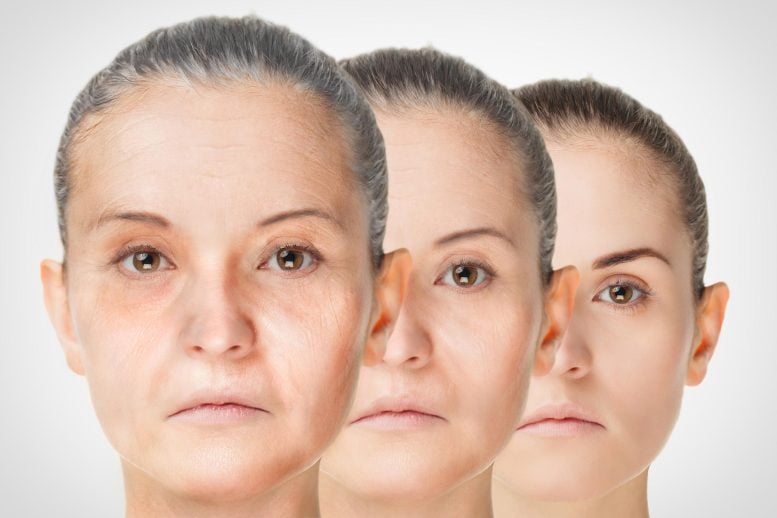
Caloric restriction has been shown to slow aging in a groundbreaking study, with effects similar to smoking cessation interventions. The CALERIE™ trial found a 2-3% slowing in aging pace in healthy adults, suggesting that slowing human aging may be possible through interventions like intermittent fasting or time-restricted eating.
Calorie restriction, a proven intervention to slow aging in animals, showed evidence of slowing the pace of biological aging in a human randomized trial.
In a first-of-its-kind randomized controlled trial, an international team of researchers led by the Columbia Aging Center at Columbia University Mailman School of Public Health shows that caloric restriction can slow the pace of aging in healthy adults. The CALERIE™ intervention slowed the pace of aging measured from participants’ blood DNA methylation using the algorithm DunedinPACE (Pace of Aging, Computed from the Epigenome). The intervention effect on DunedinPACE represented a 2-3 percent slowing in the pace of aging, which in other studies translates to a 10-15 percent reduction in mortality risk, an effect similar to a smoking cessation intervention. The results were recently published in the journal Nature Aging.
“In worms, flies, and mice, calorie restriction can slow biological processes of aging and extend healthy lifespan,” says senior author Daniel Belsky, PhD, associate professor of epidemiology at Columbia Mailman School and a scientist with Columbia’s Butler Aging Center. “Our study aimed to test if calorie restriction also slows biological aging in humans.”
The CALERIE™ Phase-2 randomized controlled trial, funded by the U.S. National Institute on Aging, part of the National Institutes of Health, is the first-ever investigation of the effects of long-term calorie restriction in healthy, non-obese humans. The trial randomized 220 healthy men and women at three sites in the U. S. to a 25 percent calorie-restriction or normal diet for two years. CALERIE™ is an acronym for ‘Comprehensive Assessment of Long-Term Effects of Reducing Intake of Energy’.
To measure biological aging in CALERIE Trial participants, Belsky’s team analyzed blood samples collected from trial participants at pre-intervention baseline and after 12- and 24-months of follow-up. “Humans live a long time,” explained Belsky, “so it isn’t practical to follow them until we see differences in aging-related disease or survival. Instead, we rely on biomarkers developed to measure the pace and progress of biological aging over the duration of the study.” The team analyzed methylation marks on DNA extracted from white blood cells. DNA methylation marks are chemical tags on the DNA sequence that regulate the expression of genes and are known to change with aging.
In the primary analysis, Belsky and colleagues focused on three measurements of the DNA methylation data, sometimes known as “epigenetic clocks.” The first two, the PhenoAge and GrimAge clocks, estimate biological age, or the chronological age at which a person’s biology would appear “normal”. These measures can be thought of as “odometers” that provide a static measure of how much aging a person has experienced. The third measure studied by the researchers was DunedinPACE, which estimates the pace of aging, or the rate of biological deterioration over time. DunedinPACE can be thought of as a “speedometer.”
“In contrast to the results for DunedinPace, there were no effects of intervention on other epigenetic clocks,” noted Calen Ryan, PhD, research scientist at Columbia’s Butler Aging Center and co-lead author of the study. “The difference in results suggests that dynamic ‘pace of aging’ measures like DunedinPACE may be more sensitive to the effects of intervention than measures of static biological age.”
Our study found evidence that calorie restriction slowed the pace of aging in humans,” Ryan said. “But calorie restriction is probably not for everyone. Our findings are important because they provide evidence from a randomized trial that slowing human aging may be possible. They also give us a sense of the kinds of effects we might look for in trials of interventions that could appeal to more people, like intermittent fasting or time-restricted eating.”
A follow-up of trial participants is now ongoing to determine if the intervention had long-term effects on healthy aging. In other studies, slower DunedinPACE is associated with reduced risk for heart disease, stroke, disability, and dementia. “Our study of the legacy effects of the CALERIE™ intervention will test if the short-term effects observed during the trial translated into longer-term reduction in aging-related chronic diseases or their risk factors,” says Sai Krupa Das, a senior scientist and CALERIE investigator who is leading the long-term follow up of CALERIE™ participants.
DunedinPACE was developed by Daniel Belsky and colleagues at Duke University and the University of Otago. To develop DunedinPACE, researchers analyzed data from the Dunedin Longitudinal Study, a landmark birth cohort study of human development and aging that follows 1000 individuals born in 1972-73 in Dunedin, New Zealand. Researchers first analyzed the rate of change in 19 biomarkers across 20 years of follow-up to derive a single composite measure of the Pace of Aging. Next, the researchers used machine-learning techniques to distill this 20-year Pace of Aging into a single-time-point DNA methylation blood test. The values of the DunedinPACE algorithm correspond to the years of biological aging experienced during a single calendar year, providing a measure of the pace of aging.
Reference: “Effect of long-term caloric restriction on DNA methylation measures of biological aging in healthy adults from the CALERIE trial” by R. Waziry, C. P. Ryan, D. L. Corcoran, K. M. Huffman, M. S. Kobor, M. Kothari, G. H. Graf, V. B. Kraus, W. E. Kraus, D. T. S. Lin, C. F. Pieper, M. E. Ramaker, M. Bhapkar, S. K. Das, L. Ferrucci, W. J. Hastings, M. Kebbe, D. C. Parker, S. B. Racette, I. Shalev, B. Schilling and D. W. Belsky, 9 February 2023, Nature Aging.
DOI: 10.1038/s43587-022-00357-y
Additional co-authors and their affiliations are listed in the paper, “Effect of long-term caloric restriction on DNA methylation measures of biological aging in healthy adults from the CALERIE trial.”
The study was supported by U.S National Institute on Aging grant R01AG061378 and also utilized resources provided by the CALERIE Research Network (R33AG070455) and the Dunedin Study (R01AG032282). Coauthors received additional support from the American Brain Foundation, and NIH grants P30AG028716, R01AG054840, R33AG070455, CIHR RN439810, R01 AG071717, R03AG071549 U01AG060906.








If this is an evolutionary strategy to extend the breeding window of potential parents living in a resource-restricted environment, then the effect might be less for those who have not yet reached sexual maturity, or who have lived beyond menopause. That is, the impact of caloric restriction might be different for different age groups. It also raises the question of whether caloric restriction increases the maximum longevity, or just extends the period of fertility.
That, must be balanced with weight loss being huge problem for the elderly. They, have to eat like crazy, to preserve muscle mass..
What was the calorie restriction? 500? 1000? 1500?
25% CR. Article is available for free:
https://www.nature.com/articles/s43587-022-00357-y
I think the reduced aging is entirely from reduced body temperature, if there is any. If so, there are easier ways to do that without suffering as much, like daily sauna which trades a short exposure to heat for a reduced body temperature for several hours. There is also an experimental drug M8-B which reduces body temperature without all the unpleasant effects like shivering and such. I think they were looking at it for more extreme situations like stroke, but maybe low dose it could work to extend lives. Metformin also reduces temperature slightly. Our enzymes are designed to work at our typical temperature, so such an intervention may not work. But the results from sauna suggests we can operate just fine a little cooler. The most likely reason bowhead whales live so long is that they operate much cooler. Same with naked mole rats. Mole rats are effectively coldblooded. We don’t know how well temperature reduction would work in humans. Orangutans are much cooler, but don’t live extraordinarily long, so maybe it does not work in primates.
Also, I should point out the most parsimonious conclusion is that calorie restriction does not work in humans and the pace thing does not work either. If you look at the paper, the controls did not age as much as they should have with the Pace thing, either, and showed no aging the second year in either the controls or the intervention group. The other two tests showed almost identical results to each other. They both showed reduced aging the first year and increased aging the second year, putting the intervention group slightly older than the controls, in both cases. Maybe calorie restriction every other year? Maybe shorter periods, like 3 months on, and 3 months off? Or maybe the humans just start cheating on the diet after a year. 3/4 calories is a very tough life. Not many people can eat like Gandhi.
One could eat like Gandhi if they had other things to do that filled up their days. We should try photosynthesis meditation. Now that’s a great diet. Yes, I said “that is a diet”. In any case, I do agree with (“Mindbraker”). Does anyone ever wonder why pregnant people appear younger during that time? Perhaps a round of starvation has a similar effect? It must have something to do with specific proteins & antioxidants that repair DNA? It has been said that the green mediterranean diet is a phenomenal choice. I read “Life Extension” magazine. They say PQQ slows aging & their mega green tea extract powerfully protects DNA. Perhaps I am selling you on them instead if not Gandhi or meditative photosynthesis.